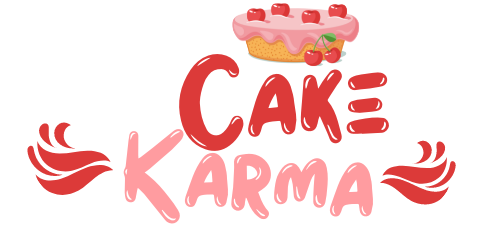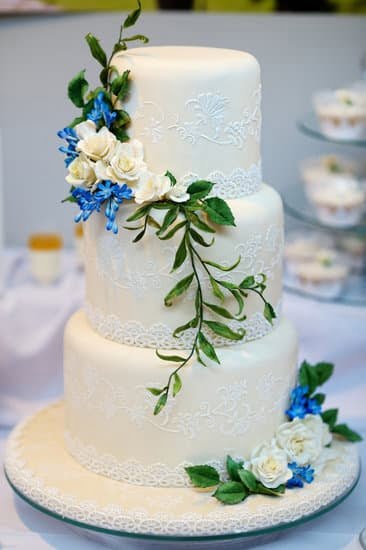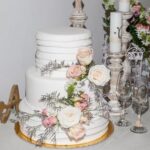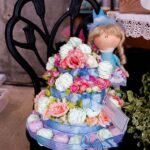Working as a cake decorator can be a truly exciting and fulfilling career choice. With the ability to bring imagination and creativity to life in the form of delicious edible creations, cake decorating offers endless possibilities for artistic expression. This introductory section will explore the fascinating world of cake decorating, giving you a glimpse into what it’s like to work in this delightful profession.
Cake decorating is not just about baking and frosting a cake; it is an art form that allows decorators to express their creativity. Whether it’s designing intricate patterns, sculpting fondant figurines, or creating breathtaking floral arrangements, cake decorators have the opportunity to showcase their artistic skills through their edible masterpieces. By combining colors, textures, and various decorations, they transform simple cakes into stunning works of art that celebrate special occasions.
To excel as a cake decorator, one needs more than just artistic talent. The job requires a set of necessary skills and training to ensure success. Attention to detail, precision piping techniques, knowledge of different icing consistencies, and an understanding of flavor combinations are all essential attributes for creating visually appealing and delectable cakes. Professional training and courses can provide valuable insights into mastering these skills, enabling decorators to continuously improve their craft.
In the following sections of this article series, we will delve deeper into various aspects of working as a cake decorator. From understanding the importance of creativity and exploring different cake decorating techniques like fondant and buttercream to learning advanced tips and tricks for mastering the art form – we will cover everything you need to know about this rewarding profession. So prepare yourself for a sweet journey through the world where sugar meets imagination.
The Importance of Creativity
Creativity is a crucial element of cake decorating, as it allows cake decorators to unleash their artistic side and bring unique and beautiful designs to life. Whether it’s a simple birthday cake or an elaborate wedding cake, the ability to think creatively ensures that each creation is one-of-a-kind and tailored specifically for the client’s needs and preferences.
Finding Inspiration
One of the first steps in unleashing your artistic side as a cake decorator is finding inspiration. This can come from various sources such as nature, fashion, art, or even other cake decorators’ work. Visiting art exhibits or browsing through magazines and websites dedicated to design can also provide fresh ideas and help you develop your own style.
Thinking Outside the Box
Creativity also involves thinking outside the box when it comes to cake design. While traditional designs have their own charm, putting your unique spin on them can make your creations stand out. Experiment with different color combinations, textures, shapes, and techniques to create cakes that are truly one-of-a-kind.
Personalizing Designs
As a cake decorator, another important aspect of creativity lies in personalizing designs for each client. Take the time to understand their preferences and vision for their special event. Incorporating personal touches such as their favorite colors, hobbies, or interests will not only showcase your creative abilities but also ensure that the final product is meaningful and memorable.
Creativity forms the backbone of cake decorating. It allows decorators to go beyond cookie-cutter designs and create edible works of art that leave a lasting impression on clients and guests alike. By finding inspiration, thinking outside the box, and personalizing designs for every client, cake decorators can truly unleash their artistic side in this exciting profession.
Necessary Skills and Training
Becoming a successful cake decorator requires a combination of creativity, technical skills, and training. While some people may have a natural aptitude for art and design, there are specific skills that need to be developed in order to excel in this field. Additionally, obtaining the necessary training and education can greatly enhance your chances of success as a cake decorator.
Artistic Skills
One of the most important skills for a cake decorator is artistic ability. Being able to envision and create visually appealing designs is crucial in this profession. Cake decorators must have a good sense of color theory, composition, and proportion. They should be able to transfer their ideas onto the canvas of a cake, using techniques such as sketching or digital design software to plan out their creations beforehand.
Technical Skills
In addition to artistic skills, cake decorators also need to develop strong technical skills. This includes proficiency in handling various types of icing and working with different decorating tools. Having a steady hand is essential when piping intricate designs or creating delicate details on cakes. Cake decorators should also have knowledge of various baking techniques and recipes so they can create delicious cakes that not only look beautiful but taste great as well.
Training and Education
While it is possible to learn cake decorating through self-teaching or online tutorials, getting formal training and education in this field can greatly accelerate your progress as a cake decorator. Many culinary schools offer specialized courses or programs in pastry arts that cover the fundamentals of cake decorating.
These programs often include hands-on practice where students can hone their skills under the guidance of experienced instructors. Additionally, becoming certified through professional organizations such as the American Culinary Federation (ACF) or the International Cake Exploration Societé (ICES) can provide further credibility and open up more job opportunities.
By developing artistic and technical skills and obtaining proper training, aspiring cake decorators can position themselves for success in this competitive industry. With a solid foundation and continuous practice, they can turn their passion for cake decorating into a fulfilling and rewarding career.
A Day in the Life of a Cake Decorator
Working as a cake decorator is an exciting and fulfilling career that allows you to transform simple cakes into edible works of art. A day in the life of a cake decorator involves taking a concept or idea and turning it into a beautiful and delicious creation. This section will provide an overview of the typical tasks and process involved in bringing a cake design to life.
Firstly, every day begins with careful planning and preparation. As a cake decorator, you will need to communicate with clients to discuss their specific needs and desires for their cakes. This involves understanding their vision, theme, color scheme, and any special requests they may have. Once you have all the necessary information, you can start brainstorming ideas and sketching out various designs.
After finalizing the design concept, the actual baking process begins. This includes measuring ingredients, mixing batter, and ensuring that each cake layer is evenly baked. As a professional cake decorator, it’s important to have advanced baking skills to ensure that your cakes not only taste amazing but also have excellent texture and structure.
Once the cakes are baked and cooled, it’s time for the fun part – decorating. This typically starts with leveling the cakes to ensure an even surface for decorating. Then comes the application of crumb coat – a thin layer of frosting that seals in any loose crumbs. Next, you’ll apply the final layer of frosting or fondant to give the cake its smooth finish.
Assembling tiered cakes might require inserting dowels for support before stacking them on top of each other. You’ll also spend time working on intricate details like piping buttercream flowers or creating fondant figurines. These finishing touches can really make the design come alive.
The Challenges and Rewards of Working as a Cake Decorator
Working as a Cake Decorator comes with its own set of challenges and rewards. The challenges that cake decorators often face include meeting tight deadlines, dealing with demanding clients, and managing multiple orders at once. However, the rewards of this profession make it all worth it for many individuals.
One of the greatest rewards of working as a cake decorator is the ability to see your creations come to life. From concept to creation, decorators have the opportunity to bring their artistic vision into reality. Each cake is a unique masterpiece, showcasing their skills and creativity. The joy and satisfaction that comes from seeing a customer’s reaction to their beautifully decorated cake is truly priceless.
Another reward of this profession is the happiness that you can bring to people’s lives through your cakes. Cake decorators are often called upon to create custom cakes for special occasions such as weddings, birthdays, and anniversaries. These celebrations are made even more memorable with a beautifully decorated cake that reflects the personality and preferences of the individual or couple. Being able to contribute to such important moments in people’s lives is incredibly fulfilling.
Furthermore, working as a cake decorator offers opportunities for continuous learning and growth. There are always new techniques and trends emerging in the world of cake decorating, giving decorators the chance to expand their skills and stay up-to-date with industry advancements. This constant evolution keeps the job exciting and allows decorators to push their creative boundaries.
In summary, while there are challenges involved in working as a cake decorator, the rewards far outweigh them. The ability to bring artistic visions to life, bring joy to others through beautiful cakes, and continue learning and growing in one’s craft make this profession both challenging and highly rewarding.
| Challenges | Rewards |
|---|---|
| Meeting tight deadlines | The joy of seeing your creations come to life |
| Dealing with demanding clients | The happiness brought to people’s lives through your cakes |
| Managing multiple orders at once | Continuous learning and growth opportunities |
Exploring Different Cake Decorating Techniques
Cake decorating is a fascinating art form that allows for endless creativity and expression. One of the most exciting aspects of working as a cake decorator is the opportunity to explore different techniques and mediums. In this section, we will delve into some of the most popular cake decorating techniques, including fondant, buttercream, and more.
Fondant
Fondant is a versatile and widely-used medium in cake decoration. It is a soft icing-like substance that can be rolled out and draped over cakes to create a smooth finish. Fondant provides the perfect canvas for intricate designs, allowing decorators to create detailed patterns, shapes, and textures on their cakes.
Additionally, fondant can be tinted with various food coloring to achieve vibrant shades that add visual appeal to any cake design. To work with fondant effectively, decorators often use tools such as rolling pins, impression mats or molds, and smoother tools to ensure a flawless finish.
Buttercream
Buttercream is another popular technique used in cake decoration. Unlike fondant, buttercream is made from butter or shortening mixed with powdered sugar to create a smooth and creamy icing. Decorators can achieve various textures by adjusting the consistency of the buttercream – from stiff peaks for piping flowers or borders to softer peaks for creating elegant swirls or rosettes.
Buttercream can be colored with gel food coloring or flavored with extracts to enhance its taste. Piping bags and tips are essential tools for working with buttercream, enabling decorators to easily pipe out different shapes and designs onto their cakes.
Other Techniques
Apart from fondant and buttercream, there are several other cake decorating techniques that enthusiasts can explore. These include:
- Royal Icing: A stiff icing made from egg whites and powdered sugar that hardens when exposed to air.
- Gum Paste: A pliable edible substance that is similar to fondant but dries into a hard finish, often used for creating delicate flowers and figurines.
- Chocolate Ganache: A mixture of chocolate and cream that can be poured over cakes for a glossy finish or used as a filling between cake layers.
- Airbrushing: The use of an airbrush tool to spray edible colors onto the cake, achieving gradients, patterns, and other effects.
Exploring different cake decorating techniques not only adds variety to your portfolio but also allows you to cater to a wider range of client preferences. By mastering these techniques, you can enhance your skills as a cake decorator and create stunning edible works of art.
Becoming an Expert
Mastering cake decoration is a journey that requires dedication, practice, and a willingness to continually learn and improve. While anyone can decorate a cake with basic techniques, becoming an expert in the field requires advanced skills and knowledge. In this section, we will explore some tips and tricks that can elevate your cake decoration to the next level.
One of the first tips for becoming an expert cake decorator is to experiment with different flavors and textures. By incorporating unique ingredients or combinations, you can create cakes that not only look visually appealing but also taste delicious. This could involve using exotic fruits, infused liqueurs, or even adding unexpected fillings between layers. The key is to push boundaries and think outside of the box when it comes to flavor profiles.
Another advanced tip for mastering cake decoration is understanding color theory and its application in design. Colors play a crucial role in creating visual impact on cakes. To become an expert decorator, it’s important to learn about various color schemes such as monochromatic, complementary, or triadic colors. Experimenting with different shades and tones can help create depth and dimension in your designs.
Furthermore, learning advanced piping techniques can greatly enhance your cake decorating skills. Techniques like royal icing lacework, stringwork, or basketweave piping can add intricate details and elegance to your creations. These techniques require patience and precision but can elevate a simple design into something truly extraordinary.
Thriving in the Cake Decorating Industry
Building a successful career in the cake decorating industry requires more than just passion for creating beautiful and delicious cakes. It also entails understanding the business side of things and continuously seeking growth and improvement. In this section, we will explore some strategies to help cake decorators thrive in their careers.
Firstly, networking is crucial in building a successful career as a cake decorator. Connecting with other professionals in the industry can provide valuable learning experiences, opportunities for collaborations, and potential referrals for new clients. Attending industry events, joining local baking or culinary associations, and participating in online communities are great ways to expand your network.
Secondly, establishing a strong online presence is essential for showcasing your work and attracting potential customers. Creating an attractive website or blog where you can showcase your portfolio, sharing pictures of your cake designs on social media platforms like Instagram or Pinterest, and engaging with your audience through regular updates will help you gain visibility within the industry.
Lastly, continuous learning and professional development are key to staying ahead in the cake decorating industry. Keeping up with current trends and techniques through attending workshops or classes will enhance your skills and broaden your knowledge. Additionally, seeking certification from reputable organizations can add credibility to your name and open doors to more opportunities.
Overall, building a successful career as a cake decorator requires a combination of artistic talent, business savvy, networking skills, marketing acumen, and dedication to continuous improvement. By following these strategies and staying committed to excellence in both creativity and professionalism, aspiring cake decorators can pave their way to thrive in this exciting industry.
| Strategy | Description |
|---|---|
| Networking | Connecting with other professionals in the industry through events and associations. |
| Establishing an online presence | Showcasing work through website, social media platforms, and regular updates. |
| Continuous learning and professional development | Keeping up with current trends and techniques through workshops and certification. |
Tools of the Trade
In conclusion, working as a cake decorator is an exciting and rewarding career choice that allows individuals to unleash their creativity and artistic side. To become a successful cake decorator, it is crucial to have the necessary skills and training, which can be acquired through formal education or on-the-job apprenticeships. A day in the life of a cake decorator involves transforming concepts into beautiful edible creations using various techniques such as fondant and buttercream.
Although working as a cake decorator comes with its own set of challenges, the rewards are immense. The joy of seeing a customer’s reaction to a beautifully decorated cake is incomparable. Aspiring cake decorators can continue to thrive in this industry by constantly learning and exploring new techniques and staying updated with the latest trends.
Having the right tools and equipment is essential for every cake decorator. From basic items like piping bags and tips to more specialized tools like levelers and turntables, these supplies make the job easier and help achieve professional-looking results. Invest in quality equipment that will last long and enhance your work.
Frequently Asked Questions
Is cake decorating a good career?
Cake decorating can be a rewarding and fulfilling career for individuals with a passion for creativity and baking. It allows professionals to showcase their artistic talents while also indulging in the joy of making delicious treats.
For those who enjoy working with their hands and have an eye for detail, cake decorating can provide a creative outlet that brings satisfaction and pride. However, it is important to note that like any career, success in cake decorating requires dedication, skill development, and building a clientele or owning a successful bakery.
How much money can you make cake decorating?
The earning potential in cake decorating can vary greatly depending on several factors such as location, level of expertise, reputation, and business structure. Cake decorators who are self-employed or own their own bakery have the flexibility to determine their pricing based on market demand and competition.
Skilled decorators who have established themselves as experts in the field can charge higher rates for custom-designed cakes or specialty creations. While some may earn a modest income starting out, others who have built a strong client base over time can significantly increase their earnings.
Is being a cake decorator stressful?
Like many professions, being a cake decorator does come with its fair share of stressors. Meeting deadlines for multiple orders, ensuring intricate designs are executed flawlessly, managing customer expectations, and working long hours during peak seasons can all contribute to increased stress levels. Additionally, there may be occasions where clients request last-minute changes or modifications that require quick thinking and adaptability.
Despite these challenges, many passionate decorators find immense joy in their work by focusing on the creative process itself rather than allowing themselves to be overwhelmed by stressors. Developing effective time management skills and learning how to effectively communicate with clients are valuable strategies in reducing stress levels within this profession.

Welcome to our cake decorating blog! My name is Destiny Flores, and I am the proud owner of a cake decorating business named Cake Karma. Our mission is to provide delicious, beautiful cakes for all occasions. We specialize in creating custom cakes that are tailored specifically to each customer’s individual needs and tastes.





